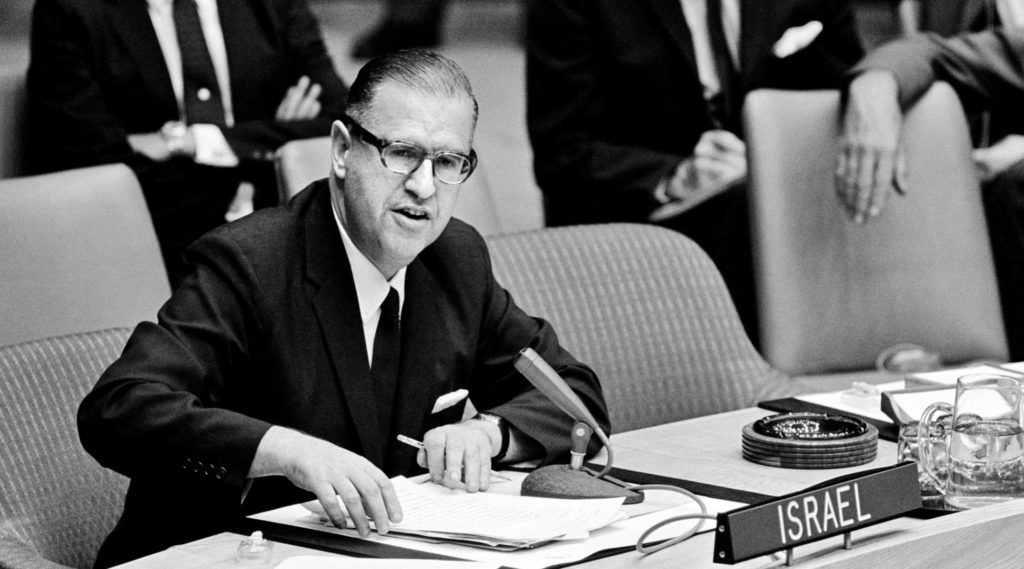Australia/Israel Review
Biblio File: Star-Crossed Diplomacy
Apr 30, 2021 | James Rudin

 The Star and the Scepter: A Diplomatic History of Israel
The Star and the Scepter: A Diplomatic History of Israel
Emmanuel Navon, Jewish Publication Society, November 2020, 536 pp. A$57.25
Jewish diplomacy began in biblical times, when Abraham negotiated with King Abimelech over possession of precious wells in an arid land. In order to protect their vulnerable communities and ensure Jewish continuity, generations of Jewish leaders have developed effective negotiation strategies in dealing with powerful kings, emperors, sultans, popes, dictators, prime ministers, and presidents.
In his new book The Star and the Scepter: A Diplomatic History of Israel, Emmanuel Navon, a lecturer at Tel Aviv University, begins with the biblical period, including the kingdoms of David and Solomon, and concludes with US President Donald Trump’s 2020 “Deal of the Century,” intended to settle the current Israeli-Palestinian conflict.
For Navon, a French-born academic, “the star” represents the spiritual faith and destiny of the Jewish people, while “the scepter” symbolises the eternal quest for Jewish national sovereignty in the Land of Israel.
In 508 pages, Navon covers three millennia of diplomatic history. The first 67 pages get us to the rise of the modern Zionist movement in the 19th century. The rest details modern Israel’s birth pangs and its intense political, military, and diplomatic struggles to survive as a Jewish state, despite fierce Arab hostility and rejection for most of its existence.
In detailing the extraordinary diplomatic efforts that culminated with the November 1947 United Nations vote on the partition of Palestine into Jewish and Arab states, Navon explains that the historic vote did not “create” the State of Israel because it was non-binding, non-enforceable, only a “recommendation.”
The author gives much of the credit for Israeli statehood to Israeli founder David Ben-Gurion, who in Navon’s view practised a superb form of Jewish realpolitik by pressing forward for an independent state despite internal and external pressure to delay, postpone, or settle for less than full Jewish sovereignty.
As a former rabbi in Kansas City who knew the Jacobson family, I was pleased that Navon recognised the key diplomatic role played by Eddie Jacobson, who fought alongside Harry S. Truman in WWI and later became the future US president’s business partner in a haberdashery shop. Navon writes: “Jacobson played a critical role in convincing Truman to back the partition plan and recognize Israel…”
When Truman initially refused to meet with Zionist leader Chaim Weizmann, an upset Jacobson replied, “This isn’t like you, Harry.” Truman replied, “You baldheaded son-of-a-bitch. You win. I’ll see him.’” On Nov. 19, 1947, just 10 days before the UN General Assembly vote, Weizmann and Truman met for two hours at the White House. Deeply influenced by Weizmann, Truman made certain the US voted for partition.
Another of Navon’s heroes was Israel’s Foreign Minister Abba Eban, who recognised Israel had to “leapfrog” over hostile Arab neighbours and create diplomatic relations with more distant nations, beginning with the Shah’s Iran, secular Turkey, and Emperor Hailie Selassie’s Ethiopia.
Navon provides insights into Israel’s diplomatic efforts to strengthen ties with Russia, India, China, Japan, and Latin and South American countries, with varying degrees of success. He also analyses Israel’s enduring peace treaties with Egypt and Jordan but completed the book prior to the recent breakthroughs with the United Arab Emirates, Sudan, Morocco and Bahrain.
Israel’s most intractable diplomatic challenge continues to be a peace deal with the Palestinians. Navon chronicles the negotiations that occurred in the waning days of Bill Clinton’s presidency in 2000, when Israeli Prime Minister Ehud Barak met with Palestinian Authority Chairman Yasser Arafat for peace talks at Camp David. Arafat shattered any hopes of a successful outcome by rejecting Israel’s significant territorial concessions with an emphatic “No!” A furious Clinton called Arafat “a liar who screwed up the whole thing and deceived us.”
Navon concludes on a positive note:
“…Israel will continue to thrive by remembering the ultimate lesson of its unique past…striking a never-ending balance between faith and power – between the star and the scepter.”
Rabbi James Rudin is Senior Interreligious Adviser at the American Jewish Committee (AJC). He is Distinguished Visiting Professor of Religion and Judaica at Saint Leo University. Reprinted from ReformJudaism.org. © ReformJudaism.org, reprinted by permission, all rights reserved.
Tags: Israel
RELATED ARTICLES

Herzog visit comes at a profoundly significant moment for the Jewish community: Arsen Ostrovsky on BBC radio





